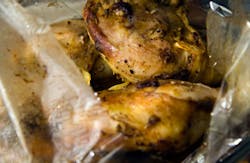Campylobacter is one of the most common causes of food poisoning in the United States and in the United Kingdom. It causes campylobacteriosis, a foodborne disease that is linked to consumption of raw or undercooked poultry meat or cross-contamination of other foods by these items.
The vast majority of cases occur as isolated events, rather than recognized outbreaks.
In an effort to reduce the rate of Campylobacter infections, two U.K. retailers are extending the use of "roast-in-the-bag" packaging. Preparing the meat in the factory in this way eliminates the need for consumers to handle raw chicken, thereby limiting the potential spread of bacteria.
The U.K.'s Foods Standards Agency advises consumers not to wash raw chicken prior to cooking, and to wash hands and utensils thoroughly after handling raw chicken.
Effective from January 2015, all whole chickens sold by The Co-operative Food will only be available to buy in special bags that can go straight into the oven.
Marks & Spencer (M&S) is also switching to 'roast-in-the-bag' packaging. Additionally, the retailer said that it has introduced bonuses for farmers who produce Campylobacter-free chickens and its food producer, 2 Sisters, has installed innovative new safety technology on the production line.
Steve Wearne, director of policy at the Food Standards Agency, welcomed the initiative by the high street retailer.
"Campylobacter is a serious issue and there is no single solution to the problem. I believe the best way to drive down Campylobacter levels is by adopting the sort of integrated approach along the food chain demonstrated by M&S and 2 Sisters," he added.
Later this week the Food Standards Agency will publish the results of a survey of Campylobacter in shop-bought chickens, which will include a breakdown of results by retailer, The Grocer reported.
